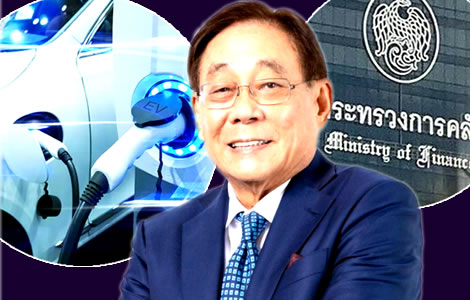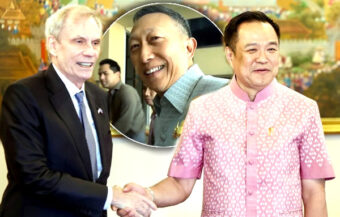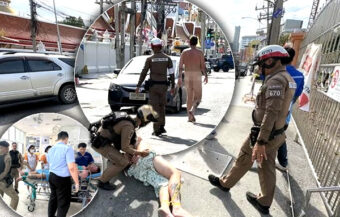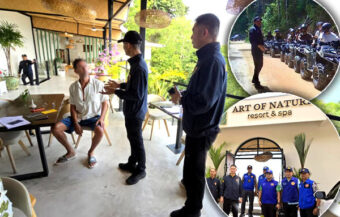Thailand shifts focus from EVs to hybrids after unsold cars pile up. New tariff-free package for hybrid cars announced, requiring a ฿3 billion investment from 2024 to 2027. EV boom stalls, glut of unsold cars impacts domestic market while ICE cars’ demand drops 43.06%.
On Friday, Thailand’s Minister of Finance Pichai Chunhavajira announced a new tariff-free package for hybrid cars manufactured in Thailand. In short, tariffs will be reduced for firms that invest not less than ฿3 billion and produce cars powered by both ICE (Internal Combustion Engine) and electric engine technology. The scheme running from 2024 to 2027 is seen as a recalibration of the country’s automotive policy. It follows weak demand for EV cars this year, with sales roughly on par with last year. In short, the EV boom has not materialised, leaving a glut of hundreds of thousands of unsold cars in Thai warehouses. Meanwhile, it has helped decimate domestic demand for traditional ICE (Internal Combustion Engine) cars, with production of vehicles in June for domestic use falling by a whopping 43.06%.

Thailand on Friday signalled it was hedging its bets over its previous all-out commitment to EV cars. Instead, in a new policy announcement, the kingdom is focusing on hybrid vehicle production or HEVs.
Certainly, the incentives remain for EV vehicles under the government’s EV 3.5 scheme.
However, there is a growing realisation that the EV industry, which is capital-intensive and does not support the country’s critical automotive parts industry, has been a mixed blessing.
Manufacturers must invest ฿3 billion in Thailand for reduced tariffs on hybrid vehicles
The new scheme reduces tariffs on hybrid vehicles for firms that manufacture in Thailand. The new package also applies to EVs provided manufacturers meet key criteria in relation to factory output in Thailand.
At the same time, manufacturers must commit to incorporating key technologies and investing ฿3 billion in Thailand between 2024 and 2027.
In the meantime, the EV boom seen in 2023 is not being reproduced in 2024.
With sales either falling or growth decelerating worldwide, it is becoming increasingly clear the all-electric EV car is not the groundbreaking game-changer that it was thought to be.
For instance, even China, which is pushing the technology, has just announced new incentives of up to ฿150,000 per car in an EV scrappage offer.
Yet it comes with the rate of growth decelerating in the communist country.
Even with that, there are still questions about sales data from China. In short, the trends being reported by Beijing do not match market trends now being reported worldwide.
Modest EV sales growth in Thailand highlights challenges facing the industry in 2024
For Thailand, June saw sales of 7,797 EV cars. That was a modest 2% rise from the same period in 2023 when 7,640 EV cars were sold.
At the beginning of this year, with a relatively good January, the industry had expected sales of EV cars to double this year to over 130,000 units. Certainly, that is not now going to happen in Thailand.
Indeed, the Electric Vehicle Association of Thailand (EVAT) told Japanese news outlet Nikkei Asia this week that there is presently a glut of unsold EV cars in the country. In short, this flows anecdotally of large stocks of EV vehicles at Laem Chabang port recently.
Top Thai insurer says no more new policies for EV cars. Later, it emphasised renewals case by case
Thailand’s EV car vision buckles as World markets and canny drivers at home take stock of what is on offer
Drivers in Thailand are turning their backs on the EV hype. Sales in April were down further at 18.4% from March
The EVAT President Krisda Utamote was upfront in his explanation.
“We are experiencing an EV oversupply as plenty of EVs imported from China over the past two years inventories,” he explained. At the same time, he confirmed that there are presently 490,000 unsold EV cars in storage. That is 63% of all vehicles produced in Thailand over the last 12 months.
EVs represent a small portion of Thailand’s market with production dropping sharply in June 2024
In the meantime, EV vehicle sales remain a relatively small percentage of overall car sales in the kingdom. In June, vehicles for the domestic market produced in Thailand were only 34,522 units. A huge drop of 43.08%. This is a catastrophic outcome by all accounts.
Meanwhile, while it is being blamed on the household debt crisis and low loan approval, it must be accepted the EV car message has confused car drivers. A car is a significant purchase and at this time the hype surrounding EV cars has created real uncertainty.
In addition, the growing scepticism about the product and reports of falling sales have spooked drivers.
These reports are both credible and the trend is growing. However, the news is mixed. Certainly also, EV cars have become both a political and highly contentious economic issue.
Amid all the reports, however, there is growing consumer dissatisfaction with the EV car itself. A shocking McKinsey & Co survey released in June shows 46% of American and 49% of Australian EV car owners plan to ditch them for ICE (Internal Combustion Engine) cars.
S&P Global and ICC predict contrasting futures for EV sales growth in Europe and America
S&P Global predicts electric vehicle sales in Europe and America to slow. In contrast, the International Chamber of Commerce predicts they will “further accelerate” over the coming years.
Undoubtedly, the once-thought runaway growth of EV sales has stalled over the last six to nine months worldwide outside of China.
Perhaps also in China given the rush by communist party authorities to unfurl new incentives even as Chinese carmakers are slashing the costs of EV products.
Undoubtedly, there must be concern over the confusion being caused by the EV car phenomenon. In short, the attempt by bureaucrats to control a critical industrial market through edicts and regulation.
In brief, it is another sign of a disconnect between elite global planners and real consumer markets.
EV sales decline significantly in Europe despite predictions of an imminent boom by experts
Certainly in Europe, sales growth of EVs has paused. Schmidt Automotive Research has confirmed that in the opening third quarter of 2024, the Western Europe EV market has dropped by 14.4% compared with the same period last year.
Sales had reached 2 million vehicles. For instance, in Ireland EV car sales fell 40% in the second quarter.
Experts backed by government forecasters have been pushing for an explosion of EV car sales between now and 2030 in Europe.
The target has been at least nine million cars a year. The current consensus is that a significantly low-cost EV vehicle may achieve this. However, this would decimate the traditional automotive industry as the world knows it.
Thailand’s shift to EV production impacts traditional automotive sector, prompting strategic changes
Indeed, this is the upshot of political efforts to change consumer behaviour.
Thailand is witnessing firsthand the emasculation of its valuable automotive sector because of the plunge into EV car production.
This year, the kingdom has already seen the end of car production in Thailand announced by both Suzuki and Subaru. Meanwhile, Honda has announced the closure of one of the kingdom’s key production centres. The Ayutthaya plant will close by 2025.
At the same time, six Chinese automakers have established in Thailand. The companies have the capacity to produce up to 750,000 cars per year. However, the question is where these cars will be sold.
The kingdom sold 76,414 EV cars in 2023. Meanwhile, in the first half of 2024, the total figure is only 39,648. In truth, the Kingdom’s EV market will be lucky to match last year’s record-breaking number.
Impact of EV production on Thailand’s traditional car industry causes widespread economic concerns
In the meantime, the fallout for the EV vehicle must be looked at. In short, it has inflicted massive damage on the kingdom’s traditional car industry.
This cannot be simply dismissed as a product of a weak economy and a tighter lending environment any longer.
For instance, while exports of ICE (Internal Combustion Engine) vehicles are down, the figure is not more than 5% this year.
Certainly, the traditional automotive sector has been dominated by Japanese firms. In addition, it has employed 750,000 workers in what are seen as good jobs by Thai standards.
The auto industry is the main driver of the country’s manufacturing sector which is export-driven. It accounts for 25.1% of the kingdom’s GDP, well ahead of the foreign tourism sector at 18%.
Some estimates suggest the automotive sector alone is 11% of Thailand’s GDP. In contrast, agriculture accounts for only 8.6% of GDP and retail 6%.
Consumer confusion in Thailand grows as Chinese carmaker BYD faces backlash over pricing strategy
The confusion caused among Thai consumers was brought home earlier this month when the Prime Minister’s Office called on Chinese carmaker BYD to address its pricing strategy.
It came following anger from Thai families who purchased cars only to find the Chinese firm offering discounts as high as ฿390,000 on some models. Previously, they were told to order quickly before previous offers ended.
The result has been a starkly diminished automotive market in Thailand. In June, only 29.69% of cars produced were sold domestically.
This was a whopping 43.08% drop from last year. For passenger cars, the fall was 28.74% with a near wipeout in the sales of Thailand’s formerly much-loved pickup trucks.
Thai government attempts to correct strategic blunder as Japanese firms endure economic storm
In the meantime, all is not lost and the Thai government may still be able to rectify what appears to have been a massive strategic blunder.
Most Japanese firms in Thailand are holding on through the current storm of confusion as well as weaker economic conditions.
Workers are being furloughed and overtime cut out to keep the plants ticking over as the kingdom still supplies its export markets with ICE (Internal Combustion Engine) vehicles.
This has extended into the predominantly Thai-owned automotive parts sector.
Thai auto parts manufacturers suffer as Chinese EV makers source parts domestically, reducing demand
Sompol Tanadumrongsak is the president of the Thai Auto Parts Manufacturers Association. This week, he spoke forthrightly to Nikkei Asia. He considered that his members of approximately 660 firms have seen output fall by up to 40% this year.
Firstly, he emphasises that Chinese EV makers are mainly sourcing their parts in China. In addition, their EV cars require fewer parts while maintaining a slimmed-down parts supply chain.
“Most local parts makers cut their operations to only three days a week as demand fell,” Mr. Sompol said. At the same time, he said that approximately a dozen had already folded.
Meanwhile, Friday’s announcement by the Thai government is thought to be a response. In short, a change of tack.
Undoubtedly behind the scenes, the government has been receiving feedback from the industry, in particular from the Federation of Thai Industries (FTI) which has been surveying car producers and the wider supply chain in recent months.
New hybrid vehicle incentives require advanced safety systems and driver assistance technology
Part of the requirement for new tariff-exempt incentives is that hybrid ICE (Internal Combustion Engine) cars with electric engines and charging options is that they are built with a complete range of advanced systems to ensure driver safety and easier driving.
The announcement on Friday came after a meeting chaired by Minister of Finance Pichai Chunhavajira and was delivered by the Secretary-General of Thailand’s Board of Investment, Narit Therdsteerasukdi.
Mr. Narit earlier alluded to the current or evolving thinking of the Thai government at the opening of a factory run by Chinese EV maker GAC Aion.
“We are glad there are more Chinese EV makers invested here in Thailand as it reflects that they are confident about our policy to support EVs,” he said. “However, it would be great if you could lend support to our parts producers by using some auto parts produced by Thai companies.”
Join the Thai News forum, follow Thai Examiner on Facebook here
Receive all our stories as they come out on Telegram here
Follow Thai Examiner here
Further reading:
Top Thai insurer says no more new policies for EV cars. Later, it emphasised renewals case by case
Lack of coherence in government policy is the root cause of Thailand’s massive economic problems
Disturbing questions that must be confronted over Thailand’s reeling economy are China and EV cars
First-quarter GDP growth surprises analysts based on higher tourism and consumer spending growth
Central bank holds interest rates. Economy will grow 2.6% in 2024 as Srettha pushes home ownership
Economy unlikely to grow in first quarter as Thai manufacturing crumbles. Hard choices ahead
New Finance Minister expected in April as economic malaise deepens with downgrades in GDP growth


















